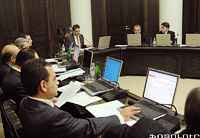People say that in addition to the negative affects of the crisis it has a positive thing too, according to which people stop for a moment in order to revise the past and think newly.
Now the authorities are indirectly confessing that something has been wrong in their past policy. The country had double-digit economic growth but the policies have always been under critics. The authorities used to say that such critics were a result of “being blind” and “failing to see the reality” but now they indirectly confess that they have been wrong. Let’s discuss such issues separately.
1. Economic growth. Till now the authorities were claiming that the country had double-digit economic growth per year, however critics used to say that it was not economic growth but GDP growth, which was mostly based on construction growth. In 2001 the statistics reported 9.6% growth. At that time the field of construction provided about 9% of the GDP. Consecutively this rate started growing: in 2002 it was 11.7%, in 2003 – 14%, etc. In 2008 the construction field covered about 23% of the GDP. However constructions have stopped and now construction businesses are faced with big crisis. As a result, it is expected that Armenia will have maximum zero growth of GDP in 2009 or stagnation. Crisis is one of the main reasons of this fact but it was predictable because relying only on construction economy cannot grow, you can’t develop the economy by constructing buildings and roads only.
2. Economy depending on money transactions from abroad. The reason why the situation in the construction market is so bad is the low expectations and falling demand. Furthermore, the demand depends on private money transfers from abroad. The same money is also used to buy consumer products. In other words, the inner demand of the economy, our labor potential depends not on ourselves, but the financial situation of our countrymen who work in Russia and US. And now, when the authorities say that the inflation, exchange rate changes and other negative economic processes are connected with money transfers from abroad, they indirectly confess that the economy of the country, which used to have a double-digit growth, mostly depends on foreign money transactions into Armenia.
3. Mere growth or growth without creating new value. Our government is very professional in interpreting one and the same thing in two different contexts. When inflation of the national currency started, the government started speaking of the interests of domestic producers and exporters. They don’t believe their words too because during the past years producers and exporters have suffered so much that they may need too many years to find a place in the international market in such difficult conditions of crisis. On the other hand, now in fact the government confesses that during the past years exporters have suffered as a result of their policy. If construction could grow in capacity up to 23% of the GDP, the vice process happened in the field of production. For example, in 2004 production capacity used to amount to 30% of the GDP, but now it is about 20% of the GDP. Meantime, other factors such as energetic resources, consumer products and raw materials and minerals have contribution to the GDP as well. There have been no innovation, IT development or new approaches. Just after the dram inflation the prices of all products were increased because now Armenia is consuming mostly products imported from other countries. In other words, Armenia is a consuming area; money is coming from outside, products are coming from outside, and we are paying for the imported products with the imported money.
4. Financial system. “Our banking system corresponds to the international standards; it is developing faster than many other fields of the economy,” the government was saying during the past years. Critics said that the banking system was not doing its main function, i.e. re-allocation of resources. Of course such critics were ignored. Even more, our officials were speaking of becoming a financial center in the region. When the crisis started the government said that the crisis would not reach Armenia as our domestic banking system is not integrated with the international financial system. In fact, the shortcoming they have been refusing so long could become an advantage at once.
In a word, the authorities now confess that the economy of our country is very vulnerable and the double-digit growth is just a myth. How did it happen that the economy, which developed fast during the past years, is faced with such crisis? Economists ask our government what is the strategy of our economy and unlike the economic growth where is going our economy and what we will have in several years. There were no concrete answers to such questions. Now we have that answer: our economy depends from the external world (but not integrated with), does not produce anything and has nothing valuable to show to the external world. In a word, it’s like a Russian famous movie, where the actor says that if you don’t have an aunt, there is no risk to lose her. For example, instead of preventing unreasonable and unjustified growth of prices they announced that the prices were still the same. The biggest crisis for our country is the crisis of credibility to the government. Lack of credibility toward the government is growing and people believe in their eyes more when they see that the price of toilette paper is increased by 40% than the assurances of the government.

